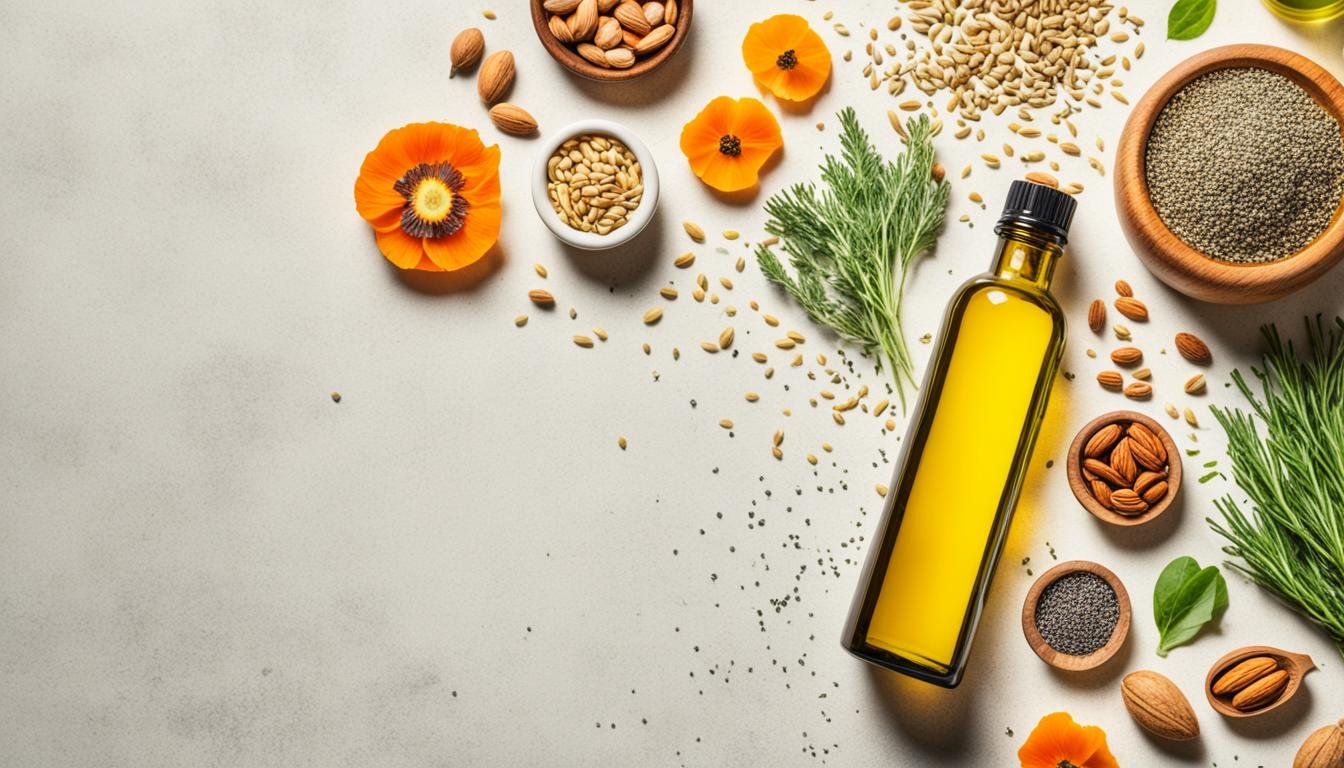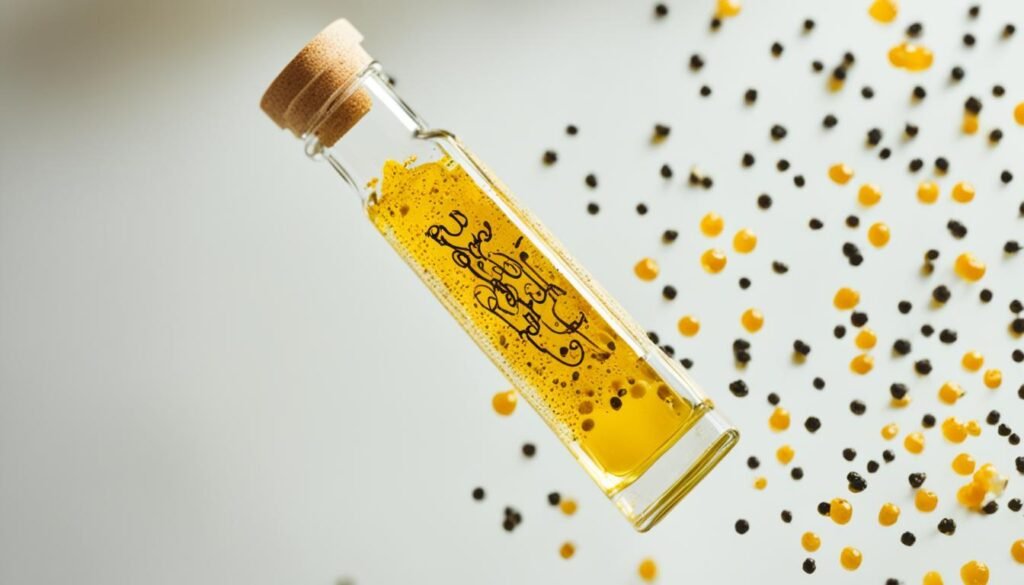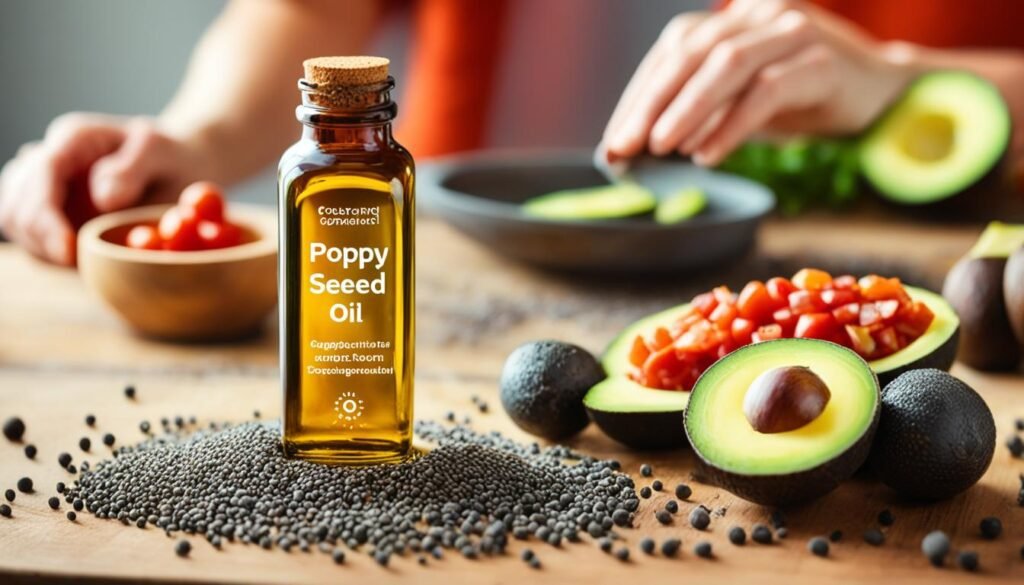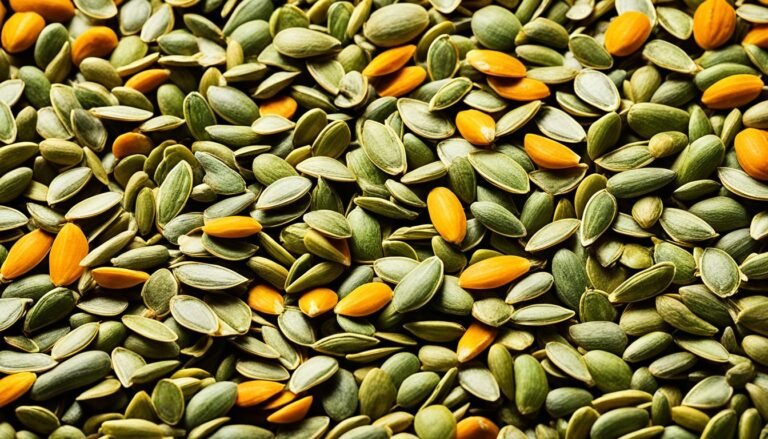Discover Poppy Seed Oil Benefits for Your Health

Did you know that every year, about 168 million pounds of poppy seeds are made? These small seeds are often used to decorate food but are packed with health benefits. Poppy seed oil comes from pressing these seeds. It’s full of nutrients, antioxidants, and fatty acids that can help your skin, hair, and overall health.
Let’s explore the amazing benefits of poppy seed oil and how it can improve your life.
Introduction to Poppy Seed Oil
Origins and Production
Poppy seeds have been used for thousands of years for both medicine and cooking. They were first found in the Mediterranean, used as a mild sedative since 2700 BC. Now, poppy seeds are used worldwide in foods, but they are grown in only 15 countries. Turkey, Czechia, and Spain are the top producers.
Extraction Process
Poppy seed oil is made through cold-pressing. This method uses pressure to get the oil out of the seeds without heat. The seeds’ oil content varies by color and origin, but they usually give 45 to 50 percent oil.
Some key facts about poppy seed oil production:
- Saponification value NaOH: 0.116
- Saponification Value KOH: 0.163
- Iodine Value: 132.2
- INCI name (PCPC): Papaver somniferum
- CAS No: 8002-11-7
Poppy seed oil is full of unsaturated fatty acids and omega 3, 6, and 9 fatty acids. These are good for the heart and brain. It also has zinc, manganese, and copper, which help with diabetes and digestion.
“Poppy seed oil is described in a Turkish study as having a rich edible flavor with waxy, fruity, creamy, roasted, and sweet notes.”
The Czech Republic and Turkey lead in poppy seed exports today. Each poppy head has hundreds of tiny seeds. It takes about 3,300 seeds to make one gram.

Antioxidant Properties of Poppy Seed Oil
Poppy seed oil is known for its strong antioxidant abilities. It may not be as strong as some oils, but it’s still great at fighting harmful ROS. This oil is full of antioxidants that help keep cells safe.
Poppy seed oil gets its antioxidant power from alpha- and gamma-tocopherols, which are types of vitamin E. These antioxidants work hard to stop free radicals and oxidative stress. This can help prevent cell damage and health problems.
Understanding Antioxidants
Antioxidants protect the body from reactive oxygen species (ROS), which are normal byproducts of cell metabolism. If not controlled, ROS can harm cells and tissues. Antioxidants in poppy seed oil are key to fighting this damage.
The antioxidants in poppy seed oil help the body fight free radicals. These molecules can lead to heart disease, cancer, and other health issues. By getting rid of free radicals, these antioxidants keep cells healthy and support overall health.

“Poppy seed oil contains valuable antioxidants like alpha- and gamma-tocopherols, which are forms of vitamin E. These powerful compounds help protect the body from the damaging effects of free radicals and oxidative stress.”
Poppy seed oil is also studied for its benefits on brain health after injury. Its antioxidants may boost antioxidant levels in the hippocampus, a key brain area for memory and learning.
Adding poppy seed oil to your diet or beauty routine can help you enjoy its antioxidant benefits. It supports your overall health and keeps you feeling good, both in body and mind.
Poppy Seed Oil Benefits for Skin and Hair
Poppy seed oil is a natural ingredient that’s good for your skin and hair. It has a mix of fatty acids that could make your skin and hair healthier and look better. Even though there’s not much research on it, its fatty acid mix shows promise.
Fatty Acid Composition
Poppy seed oil has linoleic acid, oleic acid, and palmitic acid. These fatty acids are important for your skin’s health. They help keep the skin’s barrier strong, aid in healing, and provide nutrients.
- Linoleic Acid: This omega-6 fatty acid keeps your skin from losing moisture, keeping it soft and hydrated.
- Oleic Acid: An omega-9 fatty acid that helps your skin heal faster and lowers inflammation.
- Palmitic Acid: This saturated fatty acid is key for your skin’s structure and strength.
These fatty acids are already in many skin and hair products. They could make your skin and hair healthier and look better.
| Fatty Acid | Percentage in Poppy Seed Oil | Benefits for Skin and Hair |
|---|---|---|
| Linoleic Acid (Omega-6) | 60% to 70% | Maintains the skin’s water barrier, promotes hydration |
| Oleic Acid (Omega-9) | 15% to 30% | Supports wound healing, reduces inflammation |
| Palmitic Acid | 5% to 11% | Contributes to the skin’s structural integrity |

Poppy seed oil uses these fatty acids to improve your skin and hair health. It could be a great addition to your natural beauty routine.
Poppy seed oil benefits
Poppy seed oil is known for its health benefits. It has lots of antioxidants and special fatty acids. These can help improve your health.
Antioxidant Power
Poppy seed oil is full of natural antioxidants like vitamin E. These can lower the risk of some diseases by protecting cells from harm. Studies show that poppy seed oil is very good at fighting oxidation.
Skin and Hair Benefits
The fats in poppy seed oil are good for your skin and hair. They can moisturize, feed, and protect your skin. They also help keep your hair healthy and strong.
Many people use it for dry skin, eczema, and brittle hair.
“Poppy seed oil’s antioxidants and fatty acids may offer a range of benefits for your skin and hair health.”
But, we need more studies to know how poppy seed oil really helps. Some people say it works well, but we need more proof.
A Versatile Carrier Oil
Poppy seed oil can also be a carrier oil for essential oils. It helps spread the effects of essential oils on your skin or hair. You should mix 6 to 15 drops of essential oil with one ounce of poppy seed oil.
Poppy seed oil could be good for your health, skin, and hair. Even though we need more research, it seems like a good choice for your wellness routine.

Allergic Reactions and Side Effects
Poppy seed oil has many health benefits, but be aware of possible allergic reactions and side effects. Some people might have adverse reactions when using or eating this oil.
Potential Allergens
Allergies to poppy seeds are not common but can happen. If you react badly to poppy seed oil, stop using it right away. Watch for signs of anaphylaxis, a serious allergic reaction. Symptoms include hives, swelling, coughing, trouble breathing, and stomach issues like cramps and diarrhea.
Using poppy seed oil on your skin might irritate it for some. Before applying it to a big area, test it on a small spot first. If you see redness, itching, or discomfort, don’t use it anymore and talk to a doctor.
| Allergic Reaction Symptoms | Potential Skin Irritation |
|---|---|
| Hives Swelling in the throat or face Coughing or wheezing Difficulty breathing Gastrointestinal issues (cramping, nausea, diarrhea) | Redness Itching Discomfort |
If you have any of these reactions, stop using the poppy seed oil right away. Get medical help if the symptoms get worse or don’t go away. It’s always best to be careful with potential allergic reactions or side effects.
False Positive Drug Tests from Poppy Seeds
Poppy seeds and their oil don’t have opium, as opium is from the poppy pod’s milky latex. But sometimes, during harvest, poppy latex can get on the seeds, giving them a bit of opium. This can lead to a false positive on drug tests for opioids.
The opium in poppy seeds is mostly morphine, a banned drug in sports. The World Anti-Doping Agency (WADA) says morphine in urine must be less than 1.3 micrograms/mL. Studies show morphine and codeine from poppy seeds can be found in urine for up to 48 hours after eating them.
Even after cleaning, poppy seeds can still have morphine, depending on how they’re cleaned. The U.S. Anti-Doping Agency (USADA) can’t say exactly how many poppy seeds an athlete can eat without testing positive.
Eating poppy seeds in food usually doesn’t lead to a positive drug test. But, eating a lot of them could go over the morphine limit. It’s best to avoid poppy seeds a few days before and during sports events.
Cooking can reduce morphine in poppy seeds by up to 90%, but it varies by country. Baked goods have less morphine than raw ones because baking destroys opiates. Eating more poppy seeds raises the risk of failing a drug test.
| Statistic | Value |
|---|---|
| Morphine and codeine levels in oral fluid peak 15 minutes after poppy seed ingestion | 120–205 ng/ml |
| Urinary morphine concentrations after eating a poppy seed roll | 155–1,408 nanograms per milliliter |
| Increase in retail sales of oxycodone between 1997 and 2007 | 866% |
| Opioid-related deaths in 2020 | 68,630 |
Raw poppy seeds are more likely to cause a positive drug test than baked ones. The chance of finding opioids depends on the seed type, where they come from, the food they’re in, how much you eat, when you eat them, the type of drug test, and the lab’s standards.
“Generally, consuming poppy seeds in foods does not usually result in a positive doping test. However, there is a possibility of surpassing the morphine threshold through poppy seed consumption, with the duration of morphine metabolites in the system being uncertain.”
Culinary Uses of Poppy Seed Oil
Poppy seeds are used in many cuisines around the world. They can be whole, ground, or turned into oil. This oil has a special flavor that makes many dishes better. Poppy seed oil is a key ingredient in the kitchen.
Cooking with Poppy Seed Oil
Poppy seed oil tastes nutty and a bit sweet. It’s great for adding flavor to many dishes. Here are some ways to use it:
- Salad Dressings: It’s a top choice for homemade salad dressings. It goes well with many greens and veggies.
- Pasta Dishes: Mix it with pasta, garlic, lemon, and herbs for a tasty meal.
- Baked Goods: Add it to muffins, scones, or other baked items for a nutty taste.
- Roasted Vegetables: Drizzle it on Brussels sprouts, carrots, or potatoes for flavor.
- Sauces and Marinades: Use it in sauces, dips, or marinades for more flavor.
Poppy seed oil is great for both sweet and savory dishes. It’s a must-have in any kitchen.
“Poppy seed oil is a game-changer in the culinary world. Its unique flavor profile can elevate a wide range of dishes, from salads to baked goods. I always keep a bottle on hand for endless recipe possibilities.”
Poppy seed oil is versatile and adds a special touch to recipes. Try it out to bring a nutty, aromatic taste to your dishes.
Separating Poppy Seed Oil from Opium
Poppy seeds and poppyseed oil are common in many foods. But, it’s key to know they’re different from opium. Opium comes from the poppy plant’s latex, while poppyseed oil comes from the seeds. The process to make poppyseed oil removes any trace of opium.
Poppies for medicine are grown in places like Australia, Canada, France, Iran, and Turkey. How they’re harvested affects the opium level in products. For food, poppy seeds are picked when mature and cleaned to remove any opium bits.
Poppy seeds can have alkaloids like those in opium, which might show up in drug tests. The EFSA says eating poppy seeds can give you up to 90 μg/kg of morphine a day. But, washing and treating poppy seeds can cut morphine levels by 90%.
| Country | Poppy Seed Production (2018) | Average Poppy Seed Production (2014-2018) |
|---|---|---|
| Turkey | 26,991 tonnes | 21,479 tonnes |
| Czech Republic | 13,666 tonnes | 22,739 tonnes |
| Spain | 12,360 tonnes | 11,812 tonnes |
| France | N/A | 5,467 tonnes |
| Hungary | 3,800 tonnes | 6,047 tonnes |
Turkey, the Czech Republic, and Spain are big producers of poppy seeds. The process to make poppyseed oil removes opium compounds. This makes it safe for cooking and industrial use.
Purchasing and Storing Poppy Seed Oil
When buying poppy seed oil, make sure to get it from a trusted source. Some products might not be pure, so always check the label. Always choose 100% cold-pressed poppy seed oil for the best quality.
Storing poppy seed oil right is key to keeping it fresh and high-quality. It’s full of Omega-6 fatty acids, which are good for you. Store it in a cool, dark spot, away from sunlight and heat. Use a tightly sealed container to keep it fresh for about a year.
Poppy seed oil comes in different sizes, from small to very large. Prices vary from $9.73 for a small bottle to $1,055.09 for a big one. Customers love it for its benefits to skin and hair, giving it a top rating of 5 stars.
Sometimes, the oil might be out of stock. But you can sign up for updates by email. Most orders ship within 1-3 days after processing.
“Poppy Seed Oil is recommended for various personal care applications such as skin care, hair care, nail care, cosmetics, and aromatherapy, with a suggested usage range of 1-100%.”
When buying poppy seed oil, pick a reliable source and go for 100% cold-pressed. Proper storage keeps it fresh and lets you enjoy its many benefits.
Conclusion
Poppy seed oil is a versatile and intriguing natural product. It has been used for centuries for both medicine and cooking. The research on its benefits is still growing, but it looks promising.
This oil is full of antioxidants and healthy fats like oleic and linoleic acid. These can help with skin and hair health. It also has vitamins and minerals such as vitamin E, calcium, and iron. But, be careful because some people might be allergic to it or get skin irritation. Make sure to buy high-quality, cold-pressed oil from a trusted source.
Poppy seed oil is showing great promise as a natural option with many uses. As people look for healthier choices, more research on poppy seed oil could reveal its full benefits. If you’re interested in cooking or health, trying this oil might be a good idea.
FAQ
What is poppy seed oil and where does it come from?
Poppy seed oil comes from the poppy plant, Papaver somniferum. Humans have grown this plant for thousands of years. It’s used for many things.
How is poppy seed oil produced?
To make poppy seed oil, a cold-pressing method is used. This process squeezes the oil out of the seeds without heat.
What are the antioxidant properties of poppy seed oil?
Poppy seed oil has antioxidants like alpha- and gamma-tocopherol, which are types of vitamin E. These help protect cells from damage.
What are the potential benefits of poppy seed oil for skin and hair?
The oil has fatty acids like linoleic acid, oleic acid, and palmitic acid. These can help with skin and hair health. They’re also found in some beauty products.
Are there any side effects or allergic reactions to poppy seed oil?
Some people might be allergic to poppy seeds. If you react badly to the oil, stop using it. It might irritate your skin too.
Can poppy seed oil cause false positive drug tests?
Poppy seeds might have a bit of opium if they’re not cleaned right. This could lead to a false positive on a drug test. But, this isn’t a problem with the oil itself.
How can poppy seed oil be used in cooking and baking?
Use poppy seed oil in cooking for things like salad dressings or pasta with garlic and lemon. It’s also great in baked goods like muffins and scones.
How can I ensure I’m purchasing high-quality poppy seed oil?
Make sure to buy from a trusted source. Look for 100% cold-pressed oil. Check the label to avoid any mix-ins.






